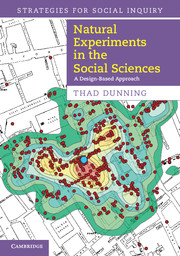Book contents
- Frontmatter
- Contents
- Detailed table of contents
- List of Figures
- List of Tables
- List of Boxes
- Preface and acknowledgements
- 1 Introduction
- Part I Discovering natural experiments
- 2 Standard natural experiments
- 3 Regression-discontinuity designs
- 4 Instrumental-variables designs
- Part II Analyzing natural experiments
- Part III Evaluating natural experiments
- Part IV Conclusion
- References
- Index
3 - Regression-discontinuity designs
Published online by Cambridge University Press: 05 November 2012
- Frontmatter
- Contents
- Detailed table of contents
- List of Figures
- List of Tables
- List of Boxes
- Preface and acknowledgements
- 1 Introduction
- Part I Discovering natural experiments
- 2 Standard natural experiments
- 3 Regression-discontinuity designs
- 4 Instrumental-variables designs
- Part II Analyzing natural experiments
- Part III Evaluating natural experiments
- Part IV Conclusion
- References
- Index
Summary
In this chapter and the next, I consider two specific kinds of natural experiments: regression-discontinuity designs in this chapter, and instrumental-variables designs in the next. When appropriately invoked, both kinds of designs meet the key definitional criterion of natural experiments—namely, random or as-if random assignment. Yet they differ in other ways, and their use tends to raise characteristic issues of discovery, analysis, and interpretation that are specific to each kind of design. This makes it valuable to discuss these two kinds of natural experiments separately in various chapters, where they can each be given more detailed attention.
The regression-discontinuity design was proposed by Thistlethwaite and Campbell (1960) and discussed extensively by Trochim (1984). Yet, for somewhat unclear reasons—and despite the extensive efforts that Donald Campbell’s research team at Northwestern University put into studying it—this research design was relatively underutilized for several decades after Campbell and his team originally proposed it. However, empirical applications have exploded in the social sciences over the past decade or so. In this chapter, I survey many recent applications, as a way to shed some light on the art of discovering productive opportunities for these modes of research. Issues of analysis and interpretation are mostly postponed for Parts II and III of this book, though some mention of them is also made here.
- Type
- Chapter
- Information
- Natural Experiments in the Social SciencesA Design-Based Approach, pp. 63 - 86Publisher: Cambridge University PressPrint publication year: 2012

